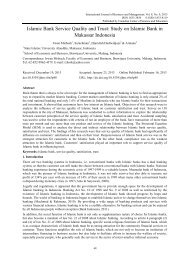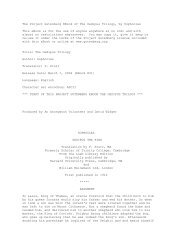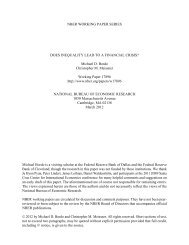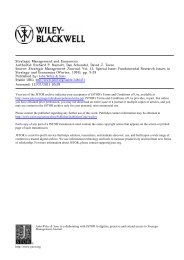The Oil Industry in Nazi Germany, 1936-1945
The Oil Industry in Nazi Germany, 1936-1945
The Oil Industry in Nazi Germany, 1936-1945
Create successful ePaper yourself
Turn your PDF publications into a flip-book with our unique Google optimized e-Paper software.
NAZI OIL INDUSTRY 275<br />
rate, and by March <strong>1945</strong> that statistic had dropped to 3 percent. From<br />
an average monthly rate of 359,000 metric tons of petroleum before<br />
the bomb<strong>in</strong>g, production had dropped to only about 11,000 metric<br />
tons.52 It is not surpris<strong>in</strong>g that the Allied bombers concentrated on the<br />
synthetic sector, given its relative importance to the German economy.<br />
However, one of the very factors that had led to the sector's rapid<br />
rise--efficient use of technological <strong>in</strong>terdependence-speeded<br />
downfall. Hitler himself expressed this problem well at a meet<strong>in</strong>g on<br />
9 May 1944 at Obersalzburg with the most important economic poli-<br />
cymakers <strong>in</strong> the Third Reich: Keitel, G6r<strong>in</strong>g, Milch, Krauch, Pleiger,<br />
Biitefisch, E. R. Fischer, Kehrl, and Speer. "In my view," he said, "the<br />
fuel, Buna rubber, and nitrogen plants represent a particularly sensi-<br />
tive po<strong>in</strong>t for the conduct of the war, s<strong>in</strong>ce vital materials for arma-<br />
ments are be<strong>in</strong>g manufactured <strong>in</strong> a small number of plants."5" Air<br />
strikes on synthetic petroleum plants yielded unexpected dividends,<br />
reduc<strong>in</strong>g the production not only of oil but also of synthetic alcohol,<br />
synthetic rubber, and synthetic nitrates, which <strong>in</strong> turn hastened the<br />
decl<strong>in</strong>e of the economy.<br />
With<strong>in</strong> the synthetic sector of the German oil <strong>in</strong>dustry, hydrogena-<br />
tion plants suffered more from the Allied onslaught than did Fischer-<br />
Tropsch plants. Bergius facilities represented nearly half of all German<br />
petroleum production capacity, and received a correspond<strong>in</strong>g percent-<br />
age of the tonnage of bombs dropped by the Allies. But production<br />
losses <strong>in</strong> the hydrogenation plants constituted over 65 percent of total<br />
German petroleum production losses due to the Allied bomb<strong>in</strong>g.<br />
Overall, 36 metric tons of production were lost for every short ton of<br />
bombs dropped on the Bergius plants. In contrast, Fischer-Tropsch<br />
plants, with 6.5 percent of total <strong>in</strong>stalled petroleum production capac-<br />
ity, were responsible for 7.5 percent of the production loss. For every<br />
short ton of bombs dropped on Fischer-Tropsch facilities, only 10 met-<br />
ric tons of production were lost. <strong>The</strong> Allies, like the <strong>Nazi</strong>s, attached<br />
great importance to hydrogenation plants, recogniz<strong>in</strong>g their crucial<br />
role <strong>in</strong> the German war economy.54<br />
In general, the crude oil sector of the German oil <strong>in</strong>dustry fared<br />
much better than the synthetic sector. In December 1944, six months<br />
after the start of the Allied offensive, crude ref<strong>in</strong><strong>in</strong>g was still proceed-<br />
<strong>in</strong>g at more than 60 percent of the rate achieved before the start of the<br />
bomb<strong>in</strong>g. In March <strong>1945</strong>, this proportion dropped to 24 percent-still<br />
much higher than the 3 percent figure for synthetic production. In<br />
52 USSBS 109, <strong>Oil</strong> Division F<strong>in</strong>al Report, 23.<br />
53 Albert Speer, Inside the Third Reich (New York, 1970; Avon books edition, 1971), 446-47.<br />
54 USSBS 109, <strong>Oil</strong> Division F<strong>in</strong>al Report, Table 11, 24.<br />
its












